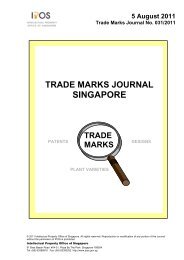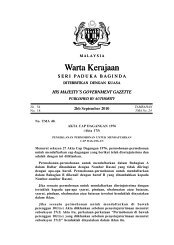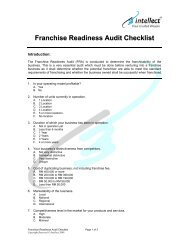Readmore - Intellect Worldwide Sdn Bhd
Readmore - Intellect Worldwide Sdn Bhd
Readmore - Intellect Worldwide Sdn Bhd
Create successful ePaper yourself
Turn your PDF publications into a flip-book with our unique Google optimized e-Paper software.
Trade Marks Journal No. 040/2010<br />
Page No. lxx<br />
Dealing With Extensions of Time and Case Management Conference Timelines (HMD<br />
Circular No. 4/2010, dated 20 August 2010)<br />
To better manage trade mark opposition, invalidation and revocation proceedings, the<br />
Registrar has, at case management conferences (CMC) convened under Rule 81A of the<br />
Trade Marks Rules 2008 Rev Ed, been issuing timelines for the filing of evidence by both<br />
parties. The primary objectives are to ensure that the parties explore the possibility of a<br />
settlement through negotiations and that all parties have the same expectations on the<br />
amount of time given to each party for the filing of evidence. This circular sets out the<br />
Registrar’s practice in relation to extensions of time for filing evidence and the application of<br />
CMC timelines.<br />
Fast-Track and Slow-Track CMC Timelines<br />
Timelines issued through CMCs are generally of two types – slow-track and fast-track.<br />
Slow-track timelines are issued in cases where parties are already exploring or are<br />
intending to explore the possibility of settlement through negotiations. In such cases, the<br />
objective of issuing a longer timeline for the party initiating the action to file his evidence is<br />
to allow parties sufficient time to negotiate and reach an amicable settlement. In other<br />
cases, fast-track timelines will be issued.<br />
This table sets out typical timelines for slow-track and fast-track cases:<br />
Evidence of<br />
initiating party<br />
Evidence of<br />
responding<br />
party<br />
Slow-Track Timelines<br />
14 months from Counter-<br />
Statement<br />
6 months from evidence of<br />
initiating party<br />
Fast-Track Timelines<br />
8 months from Counter-<br />
Statement<br />
6 months from evidence of<br />
initiating party<br />
These CMC timelines represent the maximum extent to which the Registrar will generally<br />
exercise her discretion in granting extensions of time to parties and they are predicated on<br />
the appropriate requests for extensions of time being made.<br />
Extensions of Time Within CMC Timelines<br />
The Registrar will, as a matter of general practice, grant extensions of time where they fall<br />
within the CMC timelines.<br />
Extensions of Time Beyond CMC Timelines<br />
1. Slow-Track Cases<br />
Under the slow-track timelines, as the evidence of the party initiating the action can be filed<br />
as late as 14 months from the Counter-Statement, parties effectively have a total of 14<br />
months to reach a settlement. This saves parties unnecessary expense in preparing<br />
evidence for the adversarial process while they negotiate. As 14 months would provide<br />
parties a reasonable opportunity to reach a settlement in most cases, in exercising the<br />
discretionary power under Rule 32(9), the Registrar will most likely refuse to grant any<br />
further extension of time beyond that timeline unless it is shown to the Registrar’s<br />
satisfaction that there are good and sufficient reasons to do so as required under Rule<br />
32(9).
















